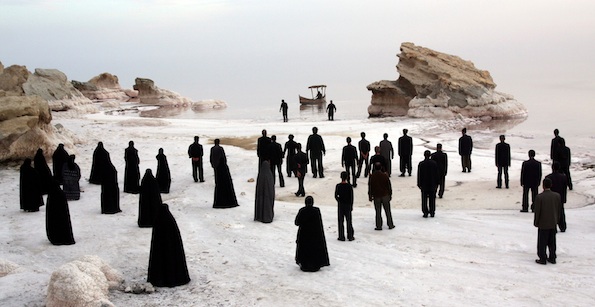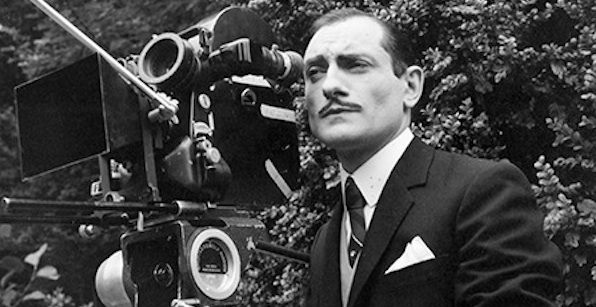We know that DVD and Blu-ray are losing sales ground to digital and streaming, but the epitaphs for physical media are premature. Every year sees another crop of restorations and revivals rolling out in superb and sometimes lavish editions.
Of course there are the upgrades, the previously available classics in newly-restored editions and state-of-the-art digital remasters, but what excites me are the debuts, the films that have never been on disc before and the personal discoveries of films that, while not exactly unknown, have been largely forgotten because of their unavailability.
Here are my perfectly subjective picks for the top ten disc debuts: the greatest classics, rediscoveries, and revivals that made their first appearance in 2013.
In alphabetical order:
Collections:
French Masterworks: Russian Émigrés in Paris 1923-1928 (Flicker Alley) presents of the American home video debut of five silent classics from Film Albatros, a French studio founded by Russian artists: The Burning Crucible (1923), Kean (1924), The Late Mathias Pascal (1926), Gribiche (1926), and The New Gentlemen (1928). The Late Mathias Pascal, a fabulist epic directed by Marcel L’Herbier (also released separately on Blu-ray), and Jacques Feyder’s sophisticated romantic comedy-turned-political satire The New Gentlemen are the crown jewels of the set but all entertaining and revealing examples of the sophisticated filmmaking coming out of France in the twenties. Each are mastered from 2009 restorations from La Cinématèque Français and feature newly-recorded original scores. DVD.
Lost and Found: American Treasures from the New Zealand Film Archive (Image) presents the American silent films–features, shorts, and fragments–that were once thought lost until their rediscovery in a New Zealand Film Archive in 2010. The highlights of this set are the first three reels of the six-reel feature The White Shadow (1924), the earliest extant film that Alfred Hitchcock worked on, and Upstream (1927), a lighthearted comedy from another master filmmaker, John Ford, set in the society of show people. The rest of the single-disc, region-free release is filled with comedy shorts, a cartoon, newsreels, and other ephemera, and there are interactive screens with notes on each film plus a booklet.
Pierre Etaix (Criterion) is one of the great comedy treasures of France but his relatively small body of work as a director–he made five features and three comedy shorts between 1961 and 1971–was out of circulation for four decades. The legal issues were finally sorted and the films restored and Criterion released them all stateside on Blu-ray and DVD. His almost silent comedy Yoyo (1965), a love story with a circus backdrop, is his masterpiece but every film in this collection is glorious, from the short Rupture (1961) and the Oscar-winning Happy Anniversary (1962) to his features The Suitor (1962) and Le Grand Amour (1969). This instant collection includes commentary on each feature and a welcome 2010 documentary on Etaix.
Single features:
King Vidor‘s 1925 The Big Parade (Warner) is both one of the greatest and grandest human dramas of the silent film era and the top-grossing silent film of the original silent era. Vidor stages some haunting and devastating war scenes and masterfully bring his own touch to the use of expressive editing to build tension and communicate terror and chaos. It was on VHS and laserdisc once upon a time but it arrived on DVD and Blu-ray for the first time this year in a beautifully-mastered edition. Film historian Jeffrey Vance’s informed commentary is interspersed with archival audio interviews with Vidor.
China Gate (Olive) was also on VHS once but the 2013 Blu-ray and DVD release is the first time that this CinemaScope production has been presented in its essential widescreen glory. Set in the early years of the Vietnam War (when it was still called Indochina) with a multinational platoon of French, American, and German career soldiers, it’s classic Fuller pulp storytelling, filled with both anti-communist rhetoric and an anti-racism message, all in a platoon mission adventure. The print isn’t flawless but it is otherwise a well-mastered version of an archival print.
The Damned (Cohen) (what an appropriate and evocative title) is an unusual 1947 French World War II thriller from René Clément, a dark twist on the classic platoon film with the collision of Nazi leaders, opportunists, and collaborators trapped on a doomed submarine mission in the final days of the war in Europe. Call it war noir, where the cabal kills itself off under pressure and a kidnapped French doctor tries to stay alive as the axis unravels. A terrific French documentary puts the production into perspective.
Marketa Lazarova (Criterion) was one of my great discoveries of the year, a 1967 immersion into a medieval culture of warring feudal lords, a film of primal imagery, poetic filmmaking, and ephemeral storytelling that looks hewn out of the stone and wood and the very earth from where it was shot. It is riveting and astounding and the Criterion edition presents a superb 4K digital restoration and a rich collection of supplemental interviews with collaborators and scholars to give American viewers background and context. Blu-ray and DVD.
Two Men in Manhattan (Cohen) was long one of my cinematic grails. Jean-Pierre Melville came to New York City to shoot location footage on the cheap for this production, a newspaper picture with the sensibility and style of a private detective odyssey. It’s slight compared to his greats but it has energy of a French New Wave film in America. It makes its American home video debut on DVD and Blu-ray accompanied by a terrific video conversation between film critics Jonathan Rosenbaum and Ignatiy Vishnevetsky.
Wake in Fright (Image), a brutal, blackly funny thriller of an urban schoolteacher (Gary Bond) in the sun-blasted Australian Outback, is considered a seminal work in the new Australian cinema but was thought lost for years until its recent rediscovery, restoration, and rerelease. Drafthouse Films brought it stateside, first in theater and then on Blu-ray and DVD with filmmaker commentary, a new featurette, and other supplements.
The White Meadows (Global Lens), a 2009 production from Iran and director Mohammad Rasoulof, is a visually striking yet startlingly bleak odyssey through a metaphorical Iran of medieval practices and brutal oppression. Just as the artist in The White Meadows is imprisoned to prevent his “incorrect perceptions” from spreading, Rasoulof (along with other Iranian filmmakers) have been persecuted by the Iranian government for his artistic “crimes.” Farsi with English subtitles. DVD only.
For the complete list of year-end lists on Keyframe, go to The Year in Film: 2013.
For the complete index of the films on these lists, go to 2013 Year in Review: Indexed.






